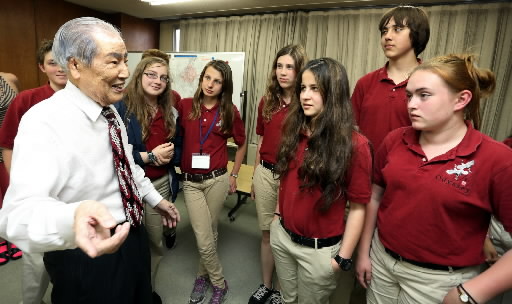My Life: Interview with Sunao Tsuboi, Chairperson of the Japan Confederation of A- and H-Bomb Sufferers Organizations, Part 15
Feb. 8, 2013
Till the end
by Sakiko Masuda, Staff Writer
Pursuing the value of life and the importance of peace
The atomic bomb survivors petitioned the central government to have cancer and other illnesses and injuries recognized as “A-bomb diseases,” but their request was rejected. Since 2006 the government has lost a series of class action lawsuits over this issue brought by the survivors as they sought a reversal of the rejection. Mr. Tsuboi is a member of a study team that has been meeting monthly since December 2010 to seek changes to the certification system.
If we don’t do this soon, the atomic bomb survivors will be gone. If there are no more survivors when the system is changed, who will the changes be for? We have to hurry. As the verdict indicated, the government must help the A-bomb survivors.
In 2011 Mr. Tsuboi was awarded the Kiyoshi Tanimoto Peace Prize, which is presented to individuals or groups that have contributed to peace.
I wondered whether I was really worthy of the award. And I wasn’t doing all that work just to get the award. But I felt nothing but gratitude upon receiving it. I just want to keep on working for the good of others.
I want to live out my days pursuing the preservation of life. These days some people speak out in favor of the expansion of Japan’s military capacity and the possession of nuclear weapons. It’s outrageous. If there’s a war, parents will bury their children. Can we say that that is normal? It is the young people with futures who die and those in high places who survive. War is below contempt.
So is nuclear deterrence. The idea of maintaining a balance in the world by possessing nuclear weapons is completely unacceptable to A-bomb survivors.
Human life is important. A world without borders may be utopian, but we must create one. When resource and territorial issues come up, we need to resolve them with persistent dialogue not with military might. To be able to do that we need education that stresses the value of life. We must ensure that people have the ability to understand the feelings of others.
Shinya Yamanaka, the Kyoto University professor who won the Nobel Prize in Physiology or Medicine, wrote a book on iPS cells. I bought it right away. If the parts of the body with something wrong can be replaced, maybe people will be able to live longer. The future will be unlimited. My wife may be calling me from the next world, but as long as I’m alive I will proceed straight down the path of peace. I will never give up, no matter what happens.
(This is the last article in this series.)
(Originally published on February 6, 2013)
by Sakiko Masuda, Staff Writer
Pursuing the value of life and the importance of peace
The atomic bomb survivors petitioned the central government to have cancer and other illnesses and injuries recognized as “A-bomb diseases,” but their request was rejected. Since 2006 the government has lost a series of class action lawsuits over this issue brought by the survivors as they sought a reversal of the rejection. Mr. Tsuboi is a member of a study team that has been meeting monthly since December 2010 to seek changes to the certification system.
If we don’t do this soon, the atomic bomb survivors will be gone. If there are no more survivors when the system is changed, who will the changes be for? We have to hurry. As the verdict indicated, the government must help the A-bomb survivors.
In 2011 Mr. Tsuboi was awarded the Kiyoshi Tanimoto Peace Prize, which is presented to individuals or groups that have contributed to peace.
I wondered whether I was really worthy of the award. And I wasn’t doing all that work just to get the award. But I felt nothing but gratitude upon receiving it. I just want to keep on working for the good of others.
I want to live out my days pursuing the preservation of life. These days some people speak out in favor of the expansion of Japan’s military capacity and the possession of nuclear weapons. It’s outrageous. If there’s a war, parents will bury their children. Can we say that that is normal? It is the young people with futures who die and those in high places who survive. War is below contempt.
So is nuclear deterrence. The idea of maintaining a balance in the world by possessing nuclear weapons is completely unacceptable to A-bomb survivors.
Human life is important. A world without borders may be utopian, but we must create one. When resource and territorial issues come up, we need to resolve them with persistent dialogue not with military might. To be able to do that we need education that stresses the value of life. We must ensure that people have the ability to understand the feelings of others.
Shinya Yamanaka, the Kyoto University professor who won the Nobel Prize in Physiology or Medicine, wrote a book on iPS cells. I bought it right away. If the parts of the body with something wrong can be replaced, maybe people will be able to live longer. The future will be unlimited. My wife may be calling me from the next world, but as long as I’m alive I will proceed straight down the path of peace. I will never give up, no matter what happens.
(This is the last article in this series.)
(Originally published on February 6, 2013)








